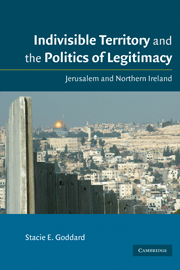1 - Introduction
Published online by Cambridge University Press: 26 January 2010
Summary
So the king said, “Bring me a sword,” and they brought a sword before the king. The king said, “Divide the living boy in two; then give half to the one, and half to the other.” But the woman whose son was alive said to the king – because compassion for her son burned within her – “Please, my lord, give her the living boy; certainly do not kill him!” The other said, “It shall be neither mine nor yours; divide it.” Then the king responded: “Give the first woman the living boy; do not kill him. She is his mother.”
Solomon's Wisdom in Judgment, 1 Kings 3:24–28.Indivisible territory is all too frequent in international politics. Jerusalem's significance as indivisible territory can hardly be overstated; it is perhaps the quintessential example of indivisible conflict. For thousands of years, men have battled over the right to rule the Holy City. In contemporary politics, Jerusalem's indivisibility continues to undermine prospects for an Israeli-Palestinian peace. Although many Israelis “insist that a united Jerusalem will be the eternal capital of the Jewish state,” Palestinian officials contend that any deal that fails to include sovereignty over Al-Aqsa Mosque and the Dome of the Rock is “an unacceptable compromise…[that] will make their blood boil.” With such irreconcilable claims to the Holy City, there can be no doubt that Jerusalem is indivisible, that any agreement acceptable to one side would be unacceptable to the other.
- Type
- Chapter
- Information
- Indivisible Territory and the Politics of LegitimacyJerusalem and Northern Ireland, pp. 1 - 17Publisher: Cambridge University PressPrint publication year: 2009

